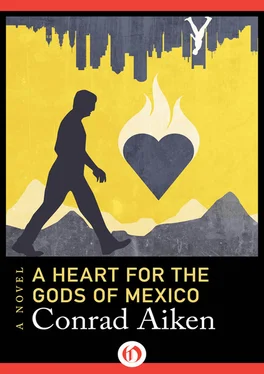“ Pulque, ” said Hambo, significantly. And then after a while he added: “I’m afraid there’s only a cold bite of tongue for supper — Josefina’s been in a bad temper today, and is frank about not liking company. But at least she doesn’t drink.”
“I’m afraid we’re rather a handful.”
“Oh gosh, no, it’s fun. I’m only too glad. But I certainly hope poor Noni isn’t going to be—”
He broke off, to lean forward and say something in Spanish to the driver. Presently the car swerved to the left, the headlights lighting brilliantly a white wall hung with bougainvillia — Blomberg had time to see that the two houses on the other side of the road were brightly lighted — and then they had come to a stop. Now, above the steady sound of the rain on the taxi roof, they could hear loud laughter, and then the marimba band, behind them. Hambo was studying the loose silver in the palm of his hand. The headlights rested on that extraordinary little tree, outside the gardener’s shed — the little tree which was covered with inverted lilies. He had never seen anything like it in his life. It was quite unreal, a sort of dream — but so, then, was everything; and he found himself wondering, while he waited for Hambo to figure out the change, whether indeed the whole strange expedition, and their presence here, and even Noni’s illness, were not just as improbable as this lamplit tree. It was the first thing he had seen, in the morning, out of his window — with hummingbirds flexing their sensitive little bodies for entrance to the hanging white blossoms — and then, too, as now, he had been inclined to read into it some esoteric meaning. Something wildly improbable, the kind of thing one thinks when in despair, or the last stages of exhaustion: as, for example, that the little tree simply meant that Noni would not die. And not only that, but also that Noni, and himself, and Gil, had never, any of them, existed at all. Everything, in short, was all right — the tree proved it.
An electric flashlight had come jerkily up the path towards them; it was Gil with an umbrella — good old Gil! But then Gil was saying to Hambo, through the swung door of the taxi — leaning forward, and rather white—
“I’m damned glad you’ve come — there’s something wrong, something’s happened — they’ve been shouting their heads off—”
“ Who have!”
“Josefina and Pablo.”
The taxi door had slammed, they were running down the slippery path in the welter of rain toward the open dining-room door. In the dining room the table was set, and beyond this, on the long verandah, they could hear the steady, angry shouting of the two voices. They were at the far end of the verandah — Josefina leaning her back to the wall, her hands folded behind her, Pablo rocking before her, very drunk, with pools of water on the tiles round his bare feet. Hambo, stick in hand, approached them slowly, his voice rising; suddenly he had shouted them down. Pablo stared sullenly, swaying; his eyes were bloodshot, he was breathing heavily. Josefina turned her bland, wrinkled face, smiling with a sort of polite cunning, the neat black braid hung forward over her shoulder. She began a long, deliberate, unexcited explanation, always smiling, her hands always clasped behind her: now and then Pablo interrupted with a violent interjection or drunken gesture, began to address Hambo, “Señor!” only at once to give in.…
It was money — his wages — but it was also his woman.… After he had gone, pocketing the few pesos Hambo had given him, and muttering to himself angrily as he lurched away among the slatting banana trees toward the English Consul’s badminton court, and the barranca beyond, the confused story was partially cleared up. But only partially. He was so drunk — Josefina made this very apparent — that he was incoherent. But he wanted his back wages, for he wanted to leave, he was in trouble. He couldn’t remember — Josefina told Hambo in Spanish — whether or not it was so, but he thought perhaps he had drawn a knife on his woman; the police would be after him; it might be better if he went to Mexico City for a few days. He had a cousin there, but he needed the pesos to get there, and for food.…
It was while Josefina was saying this once more, with glee, and just as Hambo had explained it to Gil and himself, and just, too, as Noni, with the back of one hand against her mouth, had come to the door of her room, behind them — Hambo was repeating that in all probability Pablo, being full of pulque , had simply imagined the whole thing — it was just then that they heard him coming back. They heard him still cursing, saw him stagger toward them up the dark slope of irrigated earth under the banana trees, the white figure looking very insubstantial, almost as if it drifted, and then he half fell up the tile steps, and they saw that in his hands he held a knife. Josefina screamed: Noni stood exactly as she had before, quite still, with her hand against her mouth: Hambo took a step forward. But Pablo was merely explaining — he just wanted to see his knife in the light — that was all — turning it, he moved towards the open door of Hambo’s room, he lowered it so that it might catch the rays of the lamp; and it was then that they all saw two things: one, that his trousers had been slit all the way down one leg, from waist to ankle; two, that his knife was covered with blood. While they were still standing speechless with astonishment at this, Pablo himself had already turned and gone down the steps, stooped for a moment to wipe the long blade in the grass by the path, talking to himself, and once more vanished under the banana trees towards the barranca .
“By God, I believe he’s killed her!”
Hambo turned to Gil, grinning, as he said this; and it seemed to Blomberg that he said it too loudly, too much with an air as of some symbolic meaning. The sort of theatricality he seemed rather given to — though certainly the scene itself had lacked nothing of the theatrical. The attitude, too — the forked stick held upright in the air, for all the world like a druid’s wand — seemed a shade overdone, and the characteristic embarrassed grin. A pity, almost, that there couldn’t have been a flash of lightning just then, a particularly bright one, to make the thing more spectacular still; and still further to emphasize Hambo’s obvious implication that it was all very trivial, very commonplace, and that even if he had killed her it didn’t much matter. It was life in the tropics, life in the jungle, nature red in tooth and claw! Of course. It was the heart torn from the victim’s breast, the head spitted on the tzompantli , the dark underworld current of destructive and creative blood — just as simple as that, no more complex than that. Damned funny!
And he did think it funny; until, beginning to smile at the dark current of his own thoughts, and turning his head towards Noni for an exchange of the unspoken, he saw her, with her hand still against her mouth, but her eyes now closed, start to slide down the edge of the doorjamb in a queer, hesitant, slowly freer way, which he couldn’t for a fraction of a second understand. He caught her just as her head fell forward, lifted the slight figure in his arms. The beloved golden braids shone in the lamplight immediately under his eyes. But no sooner had he touched her than he knew that her heart had ceased to beat; and he read a swift confirmation of his own surmise in the stilled faces — where the same surmise seemed to be frozen — of Hambo and poor Gil.
It had rained in torrents all night — or so, at any rate, it had seemed. To the slatting and slapping of the banana leaves in the wind, the reverberations of the thunder, and the intermittent roar of rain on the pantiled roof, had been added as well the cruelly exultant accompaniment — it seemed almost like a conspiracy — of the marimba band. There was something diabolic in this — something devilish. That steady pulse of ecstatic animal passion, throbbing in the darkness, seemed to him to have an absurd and outrageous finality in its comment on the defeated body which now lay on the cot, unlistening, in Hambo’s lamplit room. My god, what a comfort to be able to pray, as Josefina had done — to fall frankly and loudly on one’s knees, there and then, weeping, offering one’s grief and humility to that evidence of divine agony! But no such assuagement for himself and Gil; only, instead, as they looked incredulously, and as if betrayed, at Noni, or at the reflection of her in the great gilt-framed mirror which hung over the head of the bed, a sense of loss which already was widening and deepening with the winged swiftness of time itself. The reflection of the still body, in the tilted mirror, foreshortened a little in the dim light, had reminded him of some religious picture — perhaps it was the Mantegna Christ. It was a votive offering: there could be no doubt about that: it was, as he remembered now, a throwing of flowers into the sea: and that a life should have been so beautiful, and so devoted to good and beautiful things, in the face of the uncompromising principles of impermanence and violence, came to him as a fierce renewal of his faith in the essential magnificence of man’s everlasting defeat. As Noni herself, even now, would be thinking.…
Читать дальше












